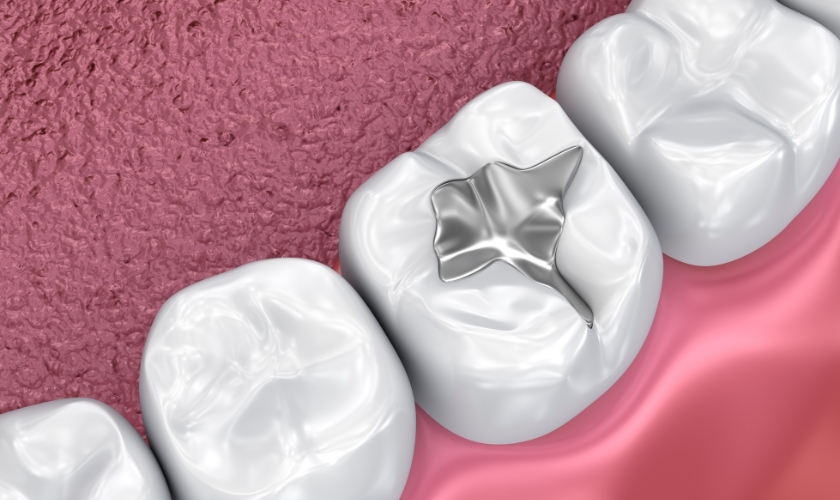Kentwood, MI

Small Cavities: Do They Require Fillings Or Can They Heal Naturally?

Maintaining optimal oral health is an ongoing journey, and navigating the decisions regarding cavities can be perplexing. One common dilemma is the fate of small cavities – should they be promptly filled, or is there a possibility for natural healing? In this exploration, we delve into the intricate realm of dental health, unraveling the mystery behind small cavities. Are they the alarm bells signaling the need for immediate intervention, or can our bodies muster their defense mechanisms? Join us on this enlightening journey as we demystify the world of small cavities and discover the pivotal role of a dentist in Kentwood, MI.
Understanding Small Cavities
Small cavities, also known as dental caries or tooth decay, refer to the early stages of damage to the enamel, which is the hard outer layer of the tooth. Enamel protects the tooth’s inner structures, such as the dentin and pulp, from bacteria and other harmful substances.
When small cavities develop, they often appear as tiny holes or weakened areas on the tooth surface. These cavities result from a process that begins with the accumulation of plaque—a sticky film of bacteria—on the teeth. The bacteria in the plaque produce acids when they come into contact with sugars from food and drinks. Over time, these acids can erode the enamel, leading to the formation of cavities.
Factors Influencing Natural Healing
The natural healing of small cavities, also known as remineralization, is influenced by various factors. Understanding these factors can provide insights into how the body can repair early-stage tooth decay. Here are some key elements that influence the natural healing process:
- Dietary Habits: A diet rich in calcium and phosphorus is essential for remineralization. These minerals contribute to the rebuilding of tooth enamel. Dairy products, leafy greens, and certain nuts are good sources. Vitamin D is crucial for the absorption of calcium. Sunlight exposure, fatty fish, and fortified foods can contribute to adequate vitamin D levels. Sugars and acidic foods contribute to enamel demineralization. Reducing the consumption of sugary and acidic foods helps create an environment that supports natural healing.
- Oral Hygiene Practices: Brushing teeth at least twice a day helps remove plaque, preventing the progression of cavities. Cleaning between teeth with dental floss removes plaque from areas that a toothbrush might miss. Using an antibacterial mouthwash can help reduce the bacterial load in the mouth.
- Saliva Composition: Saliva plays a crucial role in maintaining oral health. It helps neutralize acids, remineralize enamel, and cleanse the mouth. Staying hydrated and chewing sugar-free gum can stimulate saliva production. The mineral content of saliva, including calcium and phosphate ions, contributes to the remineralization process.
- Individual Factors: Children and young adults tend to have more robust enamel capable of remineralization. Genetic factors can influence the susceptibility to cavities and the effectiveness of natural healing processes.
- Fluoride Exposure: Fluoride, whether from toothpaste, mouthwash, or tap water, helps strengthen enamel and supports the remineralization process. Dentists may provide fluoride treatments to enhance enamel strength.
- Professional Dental Care: Routine dental check-ups can identify small cavities in their early stages, allowing for timely intervention. Dental cleanings by a dentist or dental hygienist remove plaque and tartar, creating a healthier environment for natural healing.
How Can Dental Fillings Heal Cavities Naturally?
The primary purpose of dental fillings is to restore the structure and function of a tooth damaged by decay. However, placing dental fillings is a form of intervention that prevents the progression of decay and provides a stable environment for the natural healing mechanisms of the tooth. Here’s how the combination of dental fillings and natural healing works:
Halting Decay Progression
Dental fillings are typically made of materials like amalgam or composite resin. When a Kentwood dentist identifies a cavity, they will remove the decayed part of the tooth and fill the space with the chosen material. By removing the decayed portion, the dentist halts the progression of the cavity. This prevents further damage to the tooth and surrounding structures.
Creating a Stable Environment
Dental fillings create a stable and protected environment for the tooth. This is crucial for natural healing to occur. The filling material seals the cavity, preventing bacteria and food particles from entering. This isolation helps in maintaining a clean and controlled environment within the cavity.
Promoting Remineralization
Remineralization is a natural process where minerals, such as calcium and phosphate, are deposited back into the enamel, restoring its strength and structure. A well-placed dental filling provides a surface that can attract these minerals during remineralization, aiding in the natural repair of the enamel.
Enhancing Strength
Dental fillings reinforce the weakened tooth structure. This additional strength is particularly important for teeth that have experienced significant decay. The enhanced strength provided by the filling supports the tooth’s ability to withstand the forces of biting and chewing.
Preventing Further Damage
Untreated cavities can lead to more extensive damage, potentially requiring more invasive and complex treatments like root canals or extractions. Dental fillings, when done promptly, prevent the need for more aggressive interventions, allowing the tooth to function naturally and effectively.
Balancing Act
Choosing between allowing natural healing and opting for dental fillings is a delicate balancing act. It hinges on factors such as the size of the cavity, the individual’s oral hygiene practices, and the assessment of a qualified dentist. When caught early, small cavities may benefit from natural healing mechanisms. However, neglecting professional guidance could lead to unintended consequences.
The Role Of Dentist in Kentwood, MI – Your Partner in Oral Health
The role of a dentist in Kentwood extends beyond conventional treatments. They are your partners in preventive care, offering guidance on maintaining optimal oral health. Regular dental check-ups identify cavities early and provide insights into personalized oral care routines. Dentists emphasize the importance of routine dental check-ups. These appointments allow dentists to detect issues in their early stages, including small cavities, gum disease, and oral cancer.
Dental cleanings performed by dental hygienists remove plaque and tartar, preventing cavities and gum disease. They educate patients on proper oral hygiene practices, including effective brushing and flossing techniques, and guide them on maintaining a healthy diet. A Kentwood dentist is a comprehensive oral health partner, offering various services to address preventive and therapeutic dental care. Their goal is to treat existing issues and empower individuals to take proactive steps in maintaining their oral health for the long term. Regular visits to a dentist Kentwood contribute significantly to the overall health and well-being of the local community.
In the labyrinth of small cavities, the path to optimal oral health involves a harmonious blend of natural healing and professional intervention. While the body possesses remarkable restorative capabilities, the discerning eye of a dentist is invaluable. Small cavities can heal naturally, but the key lies in vigilance – personal and professional. As we navigate the intricate landscape of dental health, let’s remember that a partnership with a trusted dentist ensures that our smiles endure the test of time, vibrant and healthy.




